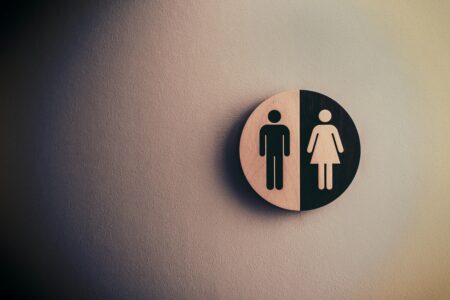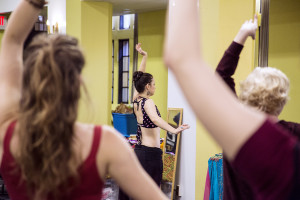
It is an astoundingly simple proposition, and yet here we are.
I shared this blog post about the men who dislike women and how we can tell on my Facebook page, and immediately, friends and acquaintances leapt in to discuss it. Most women were like “yep, that tracks.” Some men were like “Wow, I’d never thought about it that way before,” and I thanked them for taking the time to read it, because really, what system of oppression (and patriarchy is one among many) incentivizes those with power and privilege to actually sit and ponder it? Very few if any.
Then there were some men who wanted to add nuance. Which, sure, nuance is great!
But I noticed at least some of the comments came down to the following: Well, I do like women and enjoy their company, but I don’t act as though I do, because I don’t want them to get the wrong impression (that I’m flirting, that I’m available, etc.). And on the one hand, this is totally valid, because not everyone is available for every romantic configuration at every moment, and no one should have to be – so if people are assuming you are, and that’s making it weird, then yes, dispel that assumption with whichever tools you have at your disposal! And the guys on my Facebook page were respectful in their discussion, so this isn’t aimed at them as much as the general responses I see to this conversation.
However, something strikes me as odd about this idea, that men must manage women’s expectations by acting in unfriendly, antisocial, and even cold ways.
I figure that every single one of these men has social interactions that don’t revolve around the premise or promise of courtship without making it weird. They manage to have daily interactions – from the friendly to the mundane – without making it about sex.
How, dear reader, is such a thing possible?
These men are interacting with other men (and apologies for the assumption of heterosexuality here, it’s among the patterns I noticed in commenters on my post).
In the social world, men interact with other men as part of business transactions, while shopping, while dining, while doing a whole ton of activities. And unless I am missing out on some rad gay subtext happening 24/7 in mainstream social spaces, most of these men are probably managing to do so without hitting on or being hit on.
This is what most of us women want: we want to be treated as human, as a whole-ass person who can have conversations and manage business transactions and throw parties and play sports. If (presumed straight) men can manage to interact with other (presumed straight) men and have a friendly chat while doing whatever other task brings these people together in that moment, why would such a thing not be possible when interacting with women?
And yes, this is a throwback to feminist scholar Catherin MacKinnon’s classic “Are Women Human?” essay, wherein she repeatedly asks the titular question while listing numerous well-documented and sadly common instances of violence against women (rape, assault, domestic violence, street harassment, labor and sex trafficking) and asking why, in each instance, these aren’t framed as horrific human rights abuses to be battled but rather are seen as unfortunate things that simply happen repeatedly to women, as if by complete happenstance.
So I don’t mean to conflate the human subject with the masculine subject; culture has already done it for me! Hence I am borrowing some useful shorthand.
The scenarios men seem to be playing out are ones where they want to avoid inappropriate types of social conduct (wherein sexual availability is falsely presumed), and so refusing to engage with women is the way to go.
Now, I will grant that some men might hesitate to fully engage because they know many women are hit on, preyed on, objectified, and the like, which is an especial bummer when we’re just trying to live our daily lives and suddenly have to live with the reminder that some people see us as walking sex banks (don’t be that guy! Or gal, on the occasions when it happens!). Some men know they occupy tall and large bodies, and want to avoid coming across as threatening. That’s legit too.
But overall, I see some troubling assumptions embedded in these conversations, and so I feel compelled to reminder y’all: WOMEN AND MEN ARE NOT SEPARATE SPECIES!!!
And the really problematic theme I see embedded above is that men apparently feel they need to treat women differently than they’d treat a “regular” person (a.k.a. a fellow man)…because they are worried that women will treat them differently (as a sex object, a conquest, and so on).
Here is where my irony-meter goes through the roof: my good dudes, while this may seem like a problem to navigate when you encounter sexually aggressive women, this too is a symptom of patriarchy. Many women are socially conditioned to pursue higher-status male partners because we goddamn know we’re paid less, and we’re not gonna get maternity leave in this hellhole of a country, and nobody is going to protect us from all the horrific kinds of assaults visited upon women (and often in much worse ways upon women of color and trans women) unless we explicitly recruit those people to our sides by, I dunno, putting a ring on it or whatever. And don’t get me started on how domestic spaces are often even more dangerous for women; I’ll drag out my favorite terrible stat from the CDC about how half of American female homicide victims are killed by present or past male partners.
Feeling like someone doesn’t respect your boundaries or consent, hence you need to put up barriers that make you seem rude or cold or misogynist? That’s a patriarchy problem, because patriarchy teaches that sexual conquest = status, mostly for men, but women are starting to be able to take advantage of this attitude too without the only option being slut-shaming.
Feeling crummy and like someone only wants you for your money? Granted there are greedy people out there of every gender who are just assholes regardless, but, and say it with me: That’s a patriarchy problem, because Western women for centuries couldn’t own property because we WERE the property, and so snagging a man was the most reliable way of guaranteeing one’s quality of life. (brief addendum to remind that the transatlantic slave trade also made people into property, with ongoing consequences even today in terms of generational wealth disparities, state criminalization and violence, and so on; these facts can be discussed in conjunction without detracting from the severity of one another because white supremacy and patriarchy enable one another, and hopefully drawing attention to one starts to poke holes in the armor of the other)
Feeling like it’s more respectful to engage with a woman’s partner socially before engaging with her socially? That’s a patriarchy problem, because it classifies women according to their relationship to the nearest man, making men the gatekeepers of women’s ability to have a social life, just like men have long been the gatekeeper’s of whether women could enter male-dominated fields, or get medical procedures like hysterectomies, ands so on.
And of course—of friggin’ course—the irony-meter is going off when men say things like “it’s really uncomfortable to have women sexually pursue me and treat me like a conquest when I’ve already said I’m married,” because that is an experience women have all the damn time. Yes, it genuinely sucks! People shouldn’t do that to other people! It’s rude! But the overall pattern that exists in this world is one where men relentlessly pursue women, up to and including throwing harassment and violence into the mix, and so when a dude experiences this treatment from women, it is by definition and by the weight of empirical evidence a less common problem, hence not the one I want to devote extensive resources and bandwidth to. Again, yes, very crappy to experience that, but as I’ve pointed out above, these are patriarchy problems, as well as individual-people-being-assholes-regardless-of-gender problems.
One of the reasons why we keep having these damn conversations, and keep trying to explain using clear language what it’s like to be a woman stonewalled by men, or talked over, or whatever, is that by the very definition of being marginalized and socially oppressed, we cannot get our oppressors to listen to us. This is true for pretty much every social justice issue; this is why bystander interventions matter; because dudes are more likely to listen to other dudes than to listen to women, since women are presented as lower-status, less-intelligent, far-more-likely-to-be-hysterical irrational beings who are mostly good for having sex and having babies. We are constantly gaslit about our own experiences, social and professional and medical and more.
So yes, we need dudes tuning into these conversations and realizing “huh, yeah, that’s problematic” and speaking up when they see this behavior from other dudes. Because they’re more likely to be listened to and believed than we are.
If my tone is off-puttingly aggressive, please consider that a) tone policing is bullshit, and b) many of us women have experienced these frustrating dismissals a ton, and we’re tired of being polite about it. It sucks to feel sidelined and dismissed, and my guess is that a lot of dudes can relate, perhaps because racial or class-based discrimination has factored into your lives. So even if gender discrimination is still something you’re trying to wrap your head around because you haven’t experienced it much, chances are good that in this shitty racist and classist society, you’ve been put down for a trait that is not your fault, that is some arbitrary nonsense, and that hurt. The parallels don’t always function 100% but hopefully you see what I’m getting at—being judged and treated differently for an inborn trait suuuucks, and by being a dude who listens to women when we have these conversations, you have the chance to make a difference and stop perpetuating those small acts of bigotry and prejudice that add up and make things shittier.
To conclude, for fuck’s sake, please treat women like people. Don’t make it weird by assuming that you need to jump through all these bizarre hoops in order to fulfill the minimum politeness required in social interactions. Just, like, talk to us like human beings!




